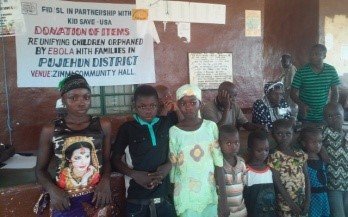By Bonnie Williams | Manager of Development
The Ebola crisis in Sierra Leone is over but the devastation remains. Children are still suffering. First taken to Ebola Care Centers by ambulances with their ailing parents, some children were sick with the virus too, yet many survived one or both parents and remained in interim care centers and orphanages. It is estimated that over 11,000 children were impacted by Ebola and that about half still remain in institutional care in spite of having living relatives. Tragically, many orphanages have used the children as the focus of fundraising efforts to help attract funding to keep the institution alive, rather than find families for them.
Kidsave and its partner help identify extended family members of children from institutions that seeks to move the children into homes. In November 24 children and their siblings had emotional reunions with relatives who had agreed to take them in. Postive conversations were held with relatives of many other children to explore their interest in taking the children in to become part of their families.
In spite of the large numbers of children being reunified there are also children whose biological families could not be located or do not exist. For these children a hosting program has been launched, starting with a community football event to attract families interested in having the children as guests in their homes for weekends and holidays, as a bridge to finding the children permanent families. Through advertisements on the radio 150 interested host families attended the football party and 15 stepped forward to learn more about hosting.
Kidsave and its partner are thrilled at the reception the biological families are giving the children. Haja Bellay, one relative of Abu Seseye and his siblings exclaimed after their reunification ceremony, “Today I fulfilled the promise I made to Abu’s parents when they were loaded in the ambulance and taken to Kenema. They never returned. I said I would take full responsibility of Abu and his siblings. Now I will care for them. They will live with my family and meet their education and health needs.”
The program faces several challenges, including poor roads between communities, the high cost of transporting children, difficulties finding extended family, and insufficient funds to hold more activities to attract families that might adopt or permanently foster the children, in cases where no extended family members exist.
This reunification/adoption effort has gained important support from the Ministry of Social Welfare, Gender and Children’s Affairs (MSWGCA) and the village chiefs. At collaborative planning meetings with the MWSGCA, several chiefs pledged their support of these efforts and promised to make sure that adopted children go to school, are not taken advantage of, and are raised in a loving family.
Kidsave has identified 325 children in more than 5 institutions in Pujehun and Bo who need support to move into family care. The Ebola crisis continues.
Kidsave’s work is made possible entirely by donors. Financial support allows us to train and hire social workers, provide the people and technology to identify, train and monitor the families and ensure the children move into and remain in safe and stable homes. Each child also receives a bed kit to take with them into to their new home. As conditions in many of the orphanages are deteriorating, the course of children’s lives are often dramatically improved by having the opportunity to grow up in a family.
Links:
Project reports on GlobalGiving are posted directly to globalgiving.org by Project Leaders as they are completed, generally every 3-4 months. To protect the integrity of these documents, GlobalGiving does not alter them; therefore you may find some language or formatting issues.
If you donate to this project or have donated to this project, you can receive an email when this project posts a report. You can also subscribe for reports without donating.
Support this important cause by creating a personalized fundraising page.
Start a Fundraiser